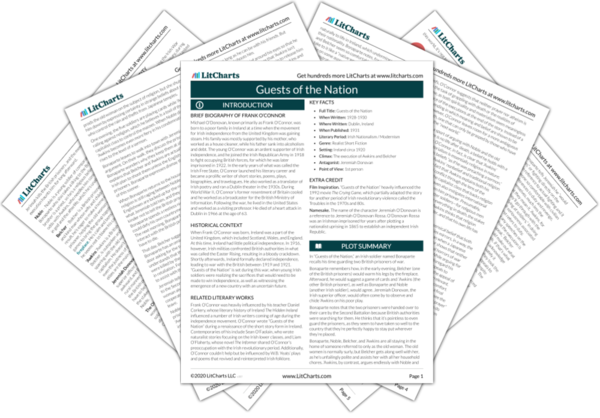In “Guests of the Nation,” the Irish soldiers unceremoniously bury the bodies of their English friends and captives, Belcher and ‘Awkins, in the bog—an ecosystem known for preserving bodies intact for thousands of years. As the image of the bog haunts Bonaparte’s mind, he always sees the “Englishmen stiffening into it.” As a result, the bog comes to symbolize the indelibility of the trauma, almost as if the bog is his mind perfectly preserving the two murdered Englishmen. This memory, like the bodies in the bog, does not fade, as Bonaparte notes that “anything that ever happened to me after I never felt the same about again.” Additionally, the status of the bog as a national symbol of Ireland comes to have extra resonance, since the story is set during a war for Irish independence. Here, O’Connor emphasizes the disillusionment of Irish independence; he twists the bog of Irish folklore into a bleak resting place for their dead friends, evoking the fact that the Irish won a sovereign country only through bloody sacrifice.
The Bog Quotes in Guests of the Nation
We walked along the edge of it in the darkness, and every now and then 'Awkins would call a halt and begin again, just as if he was wound up, about us being chums, and I was in despair that nothing but the cold and open grave made ready for his presence would convince him that we meant it all. But all the same, if you can understand, I didn't want him to be bumped off.
…but with me it was the other way, as though the patch of bog where the two Englishmen were was a thousand miles away from me, and even Noble mumbling just behind me and the old woman and the birds and the bloody stars were all far away, and I was somehow very small and very lonely. And anything that ever happened me after I never felt the same about again.












